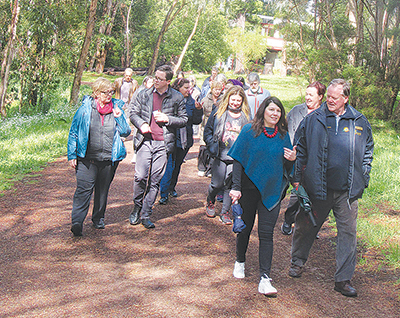The lockdowns caused by the COVID-19 epidemic have disadvantaged many with none feeling the effects more than the vast number of people who provide care at home, informally, usually fulltime and often unpaid, for family members and friends with a disability or debilitating illness.
Caring for a person with a disability or managing their mental health comes with great love and reward, but can also comes at the cost of the carer’s own health and social well-being.
Maroondah City Council, in Melbourne’s outer east has developed a program connecting carers with other carers in a relaxing and supportive environment.
The Pathway for Carers program offers carers of people with a disability or a mental health issue, an opportunity to share walks with other carers and to learn more about news, services and supports available to assist them.
The first walk was orchestrated in 2015 by Maroondah City Council in partnership with Life Assist, Yarra Ranges Council and Mt. Evelyn Community House, carers were joined by the Parliamentary Secretary for Carers, Anthony Carbine as they walked along the Mullum Creek Trail.
The program has continued to include a guest walker who interacts with carers during the walk, and makes short presentation to the group over a coffee in a café or hall after the walk. The guest walkers vary from service providers and health professionals to politicians or council staff.
The guest walkers learn from the carers in addition to passing on their knowledge and expertise, on occasion resulting in organisations introducing new programs and adjusting existing programs in response to feedback gained on the informal bushwalks.
Prior to the introduction of the National Disability Insurance Scheme (NDIS), carers had the lowest well-being of any large group measured by the Australian Unity Wellbeing index. Physically, carers were more likely to carry an injury, and almost twice as many carers were in poor physical health compared to the general population.
Mental well-being research shows carers have an average rating of moderate on the depression scale.
One participant said, “Without Pathways I don’t know where I would be. It has improved my mental health and wellbeing which has taken my self-confidence into other areas of my life.”
Maroondah City Council Community Access and Inclusion Facilitator, Jack Mulholland said Pathways for Carers had seen many carers benefit through increasing knowledge on what was available with carer support, better understanding of the NDIS, the development of new friendships and connections, an increase in health and wellbeing, and most important of all, the feeling of no longer being alone.
“For one previously isolated carer, the Pathways experiences led directly to her now accessing 13 unique services, all through information received on the walks: ‘I have accessed support for the first time. I am becoming a much better advocate for my children as I now know where to look for advice and help’.”
The Pathways for Carers program has been able to maximise benefits for carers with additional support provided by local service providers, staff at council (NDIS Transition Coordinator) and community houses, who all attend the walks.
In addition to the two original walks in Ringwood and Mt. Evelyn, the program has expanded within the Eastern region to include Monash and Knox, a weekend walk in Maroondah and a Healesville walk in the Yarra Ranges.
Mulholland said, “As we emerge from the COVID-19 pandemic, councils, community houses and organisations will be seeking opportunities to best support the recovery of their community. This program is essential if you look closely at the impact COVID-19 has had on carers.
“During COVID-19, with some services ceasing or reducing in-person offerings, many carers have increased their caring responsibilities, while their own support networks have decreased.
“Constantly remaining indoors and the cancellation of some formal supports and social groups have impacted carers, where many carers have expressed feeling overwhelmed, exhausted and socially isolated. Pathways for carers will gently open up opportunities for carers to reconnect in an understanding environment.
“I would encourage councils in the planning for recovery to get in touch with Interchange Outer East, who received funding by the State Government to roll out this project state wide.
“It will also offer them opportunities to get physically moving again in a natural environment after spending so long indoors.”
Further information on Pathways for Carers can be found at:
pathwaysforcarers.com.au

















